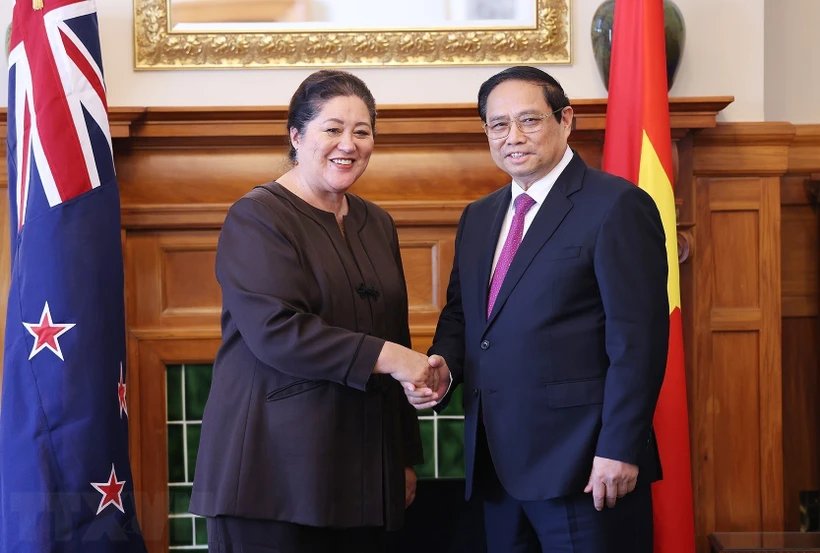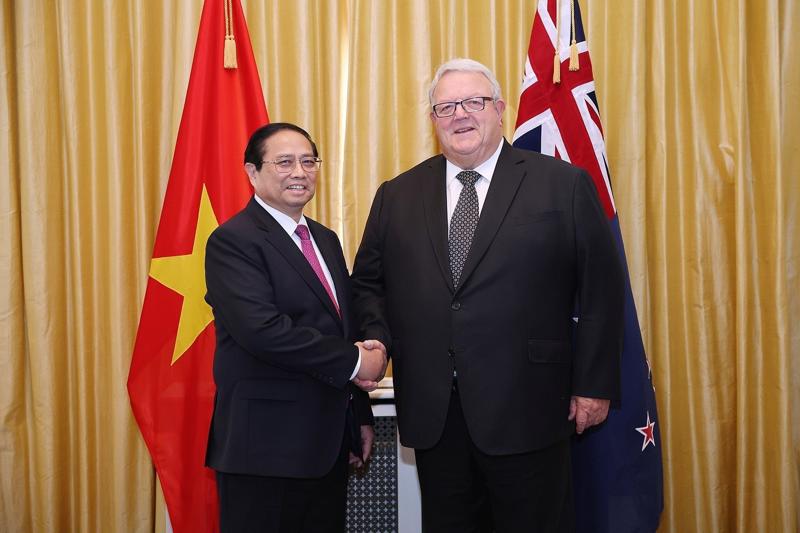On the afternoon of March 11, Prime Minister Pham Minh Chinh met with the Speaker of the New Zealand House of Representatives Gerry Brownlee, where he expressed his gratitude for the warm welcome from the Parliament and the people of New Zealand, highlighting the country’s beauty and hospitality.
Speaker Brownlee expressed his satisfaction over the positive developments of diplomatic relations and cooperation in several sectors between Vietnam and New Zealand. Both agreed to work together on labor cooperation and promoting education and training activities.
He said he will work to promote the granting of long-term visas to Vietnamese citizens in New Zealand. He highly values the contribution of the Vietnamese community to the development of New Zealand as well as relations between the country and Vietnam.
Both agreed to increasing people-to-people exchanges and cultural cooperation and contributing to strengthening the friendly relations and solidarity between the two countries.
Prime Minister Chinh suggested that both countries increase the number of high level visits as well as facilitate the entry of special fruit into each other’s market, such as bananas and passionfruit from Vietnam and kiwi fruit and cherries from New Zealand.
He also suggested that the two countries strengthen air and maritime links and provide the conditions for enhancing exchanges and sharing experience between the friendship committees and parliamentary friendship groups of the two parliaments.
Earlier in the day, the Prime Minister also met with Governor-General Cindy Kiro. According to the Ministry of Foreign Affairs, the Governor General said that Prime Minister Chinh’s visit carries special significance as it takes place right before the two countries celebrate the 50th anniversary of the establishment of diplomatic relations.
She also expressed her admiration for the resilience of the Vietnamese people, saying that the country now has an increasingly important position in the region as well as in the international community. She stressed that New Zealand views Vietnam as one of its most important partners in ASEAN.
Discussing the results of the meeting with Prime Minister Christopher Luxon earlier that day, Prime Minister Chinh emphasized that both sides still have ample opportunities to further develop their strategic partnership.
In this spirit, both agreed to enhance and deepen relations in all areas, promote people-to-people exchanges, leverage the roles of friendship associations between the two countries, and consider the resumption of direct flights.

Prime Minister Chinh also reiterated the six main cooperative areas that both countries need to focus on in the future.
These include enhancing high-level delegation exchanges and fully implementing bilateral cooperation mechanisms; boosting trade and investment; deepening cooperation in education and training, especially by increasing scholarships; collaborating on building a green, sustainable economy and environmental protection; increasing cultural exchanges; and promoting labor cooperation.
He suggested that New Zealand continue to care for and create favorable conditions for the Vietnamese community currently living and studying in the country, who he considers an important bridge to strengthen ties and cooperation between the two countries.
Governor-General Kiro affirmed the continuous support and attention towards the Vietnamese community, acknowledging their contributions to the development of New Zealand and enriching its cultural diversity.
At both meetings, Prime Minister Chinh and New Zealand leaders discussed regional and international matters of shared interest. Both countries agreed to support each other at international organizations, including the UN and in ASEAN-led mechanisms and inter-parliamentary forums.









 Google translate
Google translate